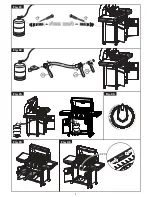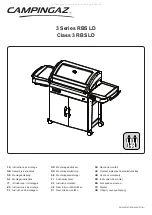
13
Problem
Possible Cause
Solution
Burner won’t light
Gas pressure is low.
Cylinder is empty. Replace cylinder.
Air in gas line.
Burner may take up to one minute to light
after a propane cylinder has been connected.
Igniter is wet.
Light the grill with a match.
Burner won’t stay lit
Dust and/or dirt built up around burner
Clean dirt and/or dust from around burner.
Burner flame is low
Gas pressure is low
Replace cylinder.
Outdoor temperature is less than 40° F
Use a full cylinder.
and tank is less than 1/4 full.
Fuel flow is restricted.
Check burner and orifices for blockage. Adjust control
knob to full ON position.
Fuel flow is restricted.
Check burner, orifices and venturi for blockage (bugs,
Excessive yellow flames.
dirt, cobwebs).
Improper Flame
(Flame should be blue with
hint of yellow on tips)
■
Disconnect regulator from cylinder. If stored indoors, detach and leave
cylinder outdoors.
■
Store propane tank in safe manner. Refer to Chapter 5 of
Standard for
Storage and Handling of Liquefied Gases, ANSI/NFPA 58. Follow all local
codes. Always store propane tanks outdoors.
■
Store grill in a dry, clean and safe place.
• BURN HAZARD
• Do not touch or attempt any maintenance on grill for at least one hour
after use.
• Make sure all controls are off and propane tank has been removed
before doing maintenance.
WARNING
To enjoy years of outstanding performance from your grill, perform the fol-
lowing maintenance activities on a regular basis:
• Keep exterior surfaces clean.
• Use warm soapy water for cleaning. Never use flammable or abrasive
cleaning agents.
• Airflow must be unobstructed. Keep controls, burner and circulating air
passages clean. Signs of possible blockage include:
-Gas odor
-Grill makes popping noises
-Smoky flame.
• Carbon deposits may create a fire hazard. Clean burner with warm
soapy water if any carbon deposits develop.
• If the grill has been left uncovered and is wet from rain, snow, yard
sprinklers, etc., allow to dry (at least 30 minutes prior to use).
• NOTE: In a salt-air environment (such as near an ocean), corrosion
occurs more quickly than normal. Frequently check for corroded areas
and repair them promptly.
• For more complicated maintenance or to obtain repairs, please contact
The Coleman Company, Inc.
1. It is unsafe and illegal in some places to store or use propane cylinders of greater than 1.14 kg (2.5 lbs) water capacity (approximately 1 lb. propane) in
occupied enclosures.
2. If not completely satisfied with the performance of this product, please call one of the numbers listed on the cover of this manual.
3. Cool weather prevents proper vaporization of propane inside the tanks. For best results, do not use below 32° F (0°C).
■
For long-term storage, clean and dry all grill parts before storing. This
will keep the unit clean and ready for the next season.
Storage
Maintenance
Things You Should Know
Troubleshooting


































